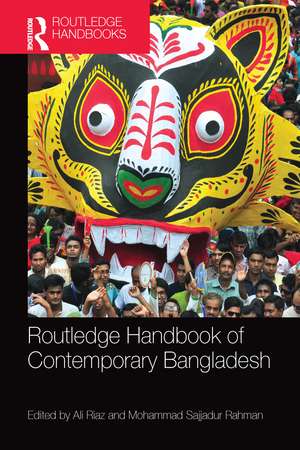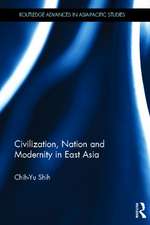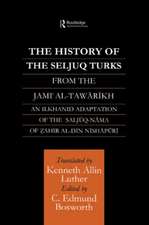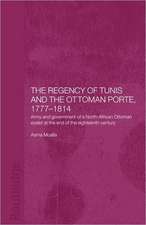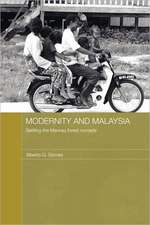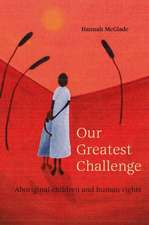Routledge Handbook of Contemporary Bangladesh
Editat de Ali Riaz, Mohammad Sajjadur Rahmanen Limba Engleză Paperback – 30 iun 2020
- History and the making of contemporary Bangladesh
- Politics and institutions
- Economy and development
- Energy and environment
- State, society and rights
- Security and external relations
Written by a team of international experts in the field, the chapters provide an accessible and up-to-date insight into contemporary Bangladesh. The Handbook will be of interest to students and academics of South Asian studies, as well as policymakers, journalists and others who wish to learn more about this increasingly important country.
| Toate formatele și edițiile | Preț | Express |
|---|---|---|
| Paperback (1) | 429.54 lei 6-8 săpt. | |
| Taylor & Francis – 30 iun 2020 | 429.54 lei 6-8 săpt. | |
| Hardback (1) | 1218.50 lei 6-8 săpt. | |
| Taylor & Francis – 3 feb 2016 | 1218.50 lei 6-8 săpt. |
Preț: 429.54 lei
Nou
Puncte Express: 644
Preț estimativ în valută:
82.19€ • 85.65$ • 68.06£
82.19€ • 85.65$ • 68.06£
Carte tipărită la comandă
Livrare economică 03-17 aprilie
Preluare comenzi: 021 569.72.76
Specificații
ISBN-13: 9780367581657
ISBN-10: 0367581655
Pagini: 468
Dimensiuni: 174 x 246 x 24 mm
Greutate: 0.77 kg
Ediția:1
Editura: Taylor & Francis
Colecția Routledge
Locul publicării:Oxford, United Kingdom
ISBN-10: 0367581655
Pagini: 468
Dimensiuni: 174 x 246 x 24 mm
Greutate: 0.77 kg
Ediția:1
Editura: Taylor & Francis
Colecția Routledge
Locul publicării:Oxford, United Kingdom
Public țintă
PostgraduateCuprins
Introduction Part I: History and the Making of Contemporary Bangladesh 1. Bangladeshi Politics since Independence, Sarah Tasnim Shehabuddin 2. Nationalism and the ‘Politics of National Identity’, Habibul Haque Khondker 3. Secularism and Anti-Secularism, Shantanu Majumder 4. The Genocide of 1971 and the Politics of Justice, Navine Murshid Part II: Politics and Institutions 5. Political Parties, Elections and Party Systems, Ali Riaz 6. The Parliament, Nizam Ahmed 7. Public Administration and Bureaucracy, Habib Zafarullah 8. Civil-Military Relations, Al Masud Hasanuzzaman 9. Non-Governmental Organizations and Civil Society, David Lewis Part III: Economy and Development 10. Development Policies since Independence, Fahmida Khatun 11. Agriculture and Food Security, Uttam Kumar Deb 12. Industrialization, Rashed Al Mahmud Titumir 13. Labor, Farida Chowdhury Khan 14. Foreign Trade, Selim Raihan 15. International Labor Migration and Remittance, Tasneem Siddiqui 16. Urbanization, A K M Riaz Uddin 17. Poverty, Inequality and Entrepreneurship, Syed Akhtar Mahmood 18. Microfinance, Muinul Islam Part IV: Energy and Environment 19. Power and Energy: Potentials, Crisis and Planning, Moshahida Sultana 20. Climate Change, M. Asaduzzaman 21. Water, Md. Khalequzzaman Part V: State, Society and Rights 22. Human Rights and the Law, Mohammad Shahabuddin 23. State of Gender, Amena Mohsin 24. The CHT and the peace process, Bhumitra Chakma 25. Religious Minorities, Meghna Guhathakurta 26. Print and Electronic Media, Anis Rahman 27. The Education System, Manzoor Ahmed 28. Public Health, Arafat Kabir Part VI: Security and External Relations 29. Foreign Policy, Imtiaz Ahmed 30. Bangladesh and its Neighbors, Mohammad Sajjadur Rahman 31. Bangladesh and the Great Powers, Lailufar Yasmin 32. Borders, Boundaries and Statelessness, Bina D’Costa 33. UN Peacekeeping Mission, Rashed Uz Zaman 34. Terrorism and Counter-terrorism, Saimum Parvez
Notă biografică
Ali Riaz is Professor and Chair of Department of Politics and Government at Illinois State University, Illinois, USA. Previously, he worked as a Broadcast Journalist at the British Broadcasting Service (BBC) in London. His most recent publications include How Did We Arrive Here? (2015) and Political Islam and Governance in Bangladesh (Routledge, 2010).
Mohammad Sajjadur Rahman is a Research Fellow at Centre for Alternatives, Dhaka, Bangladesh and a PhD student at Clark University, Massachusetts, USA. He has published a number of articles in scholarly journals and contributed chapters in edited volumes.
Mohammad Sajjadur Rahman is a Research Fellow at Centre for Alternatives, Dhaka, Bangladesh and a PhD student at Clark University, Massachusetts, USA. He has published a number of articles in scholarly journals and contributed chapters in edited volumes.
Recenzii
"The book is a proud recounting of achievements, as well as an attempt to present the difficulties, with all their complexities, that the country has faced. This has been done with great attention to brevity and clarity. This book will be a standard reference work on Bangladesh for years to come, and a necessary addition to any collection on the region in general and on Bangladesh. Bangladesh as a 'test case for development' offers useful insights for other 'less developed' countries and their donors."
Wolfgang-Peter Zingel, International Quarterly for Asian Studies
Wolfgang-Peter Zingel, International Quarterly for Asian Studies
Descriere
In the past decade, Bangladesh has achieved significant social and economic progress. Despite high population density, a limited natural-resource base, underdeveloped infrastructure, frequent natural disasters and political uncertainty, the country has recorded positive developments in terms of broad economic and social indicators.
